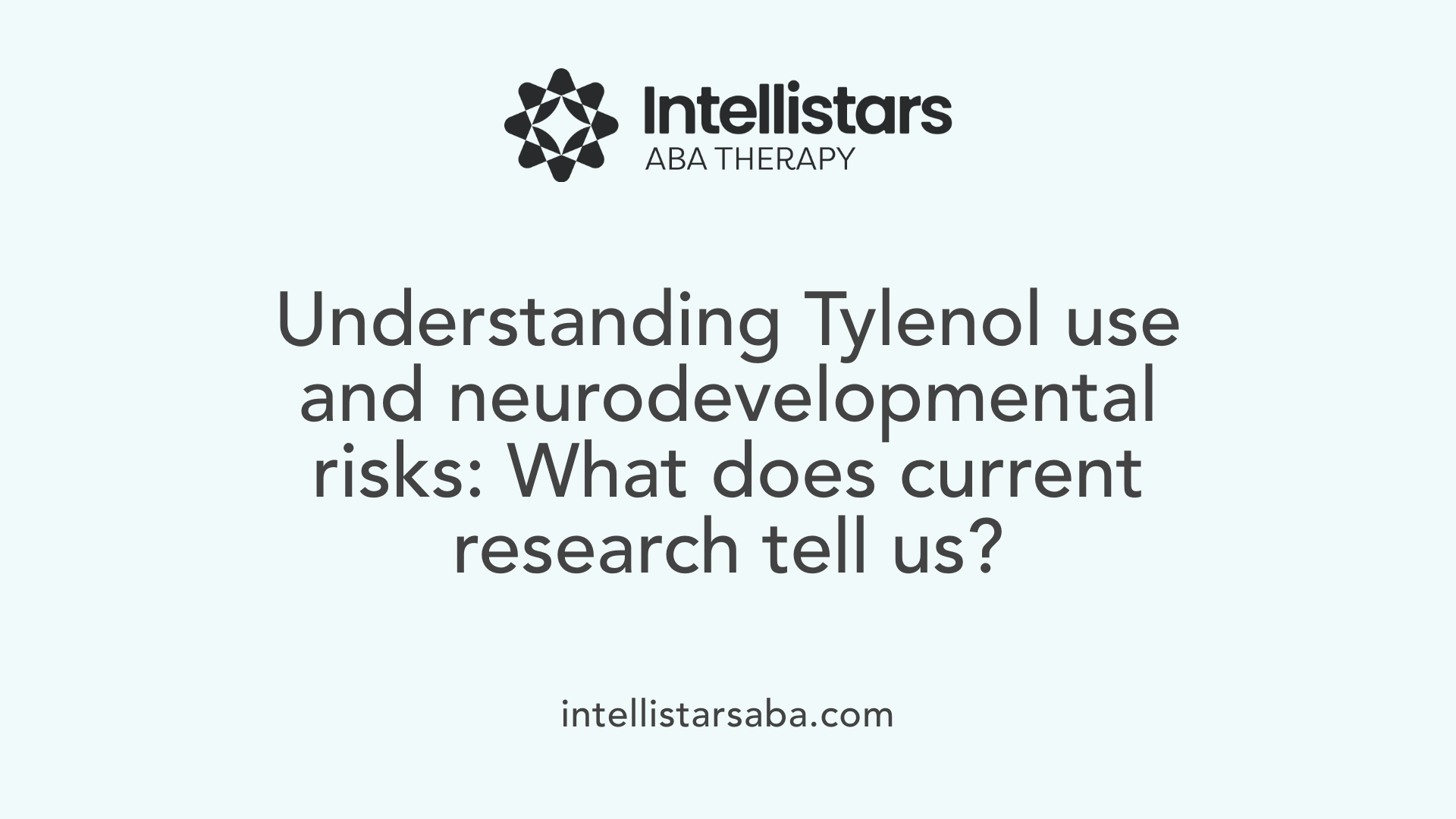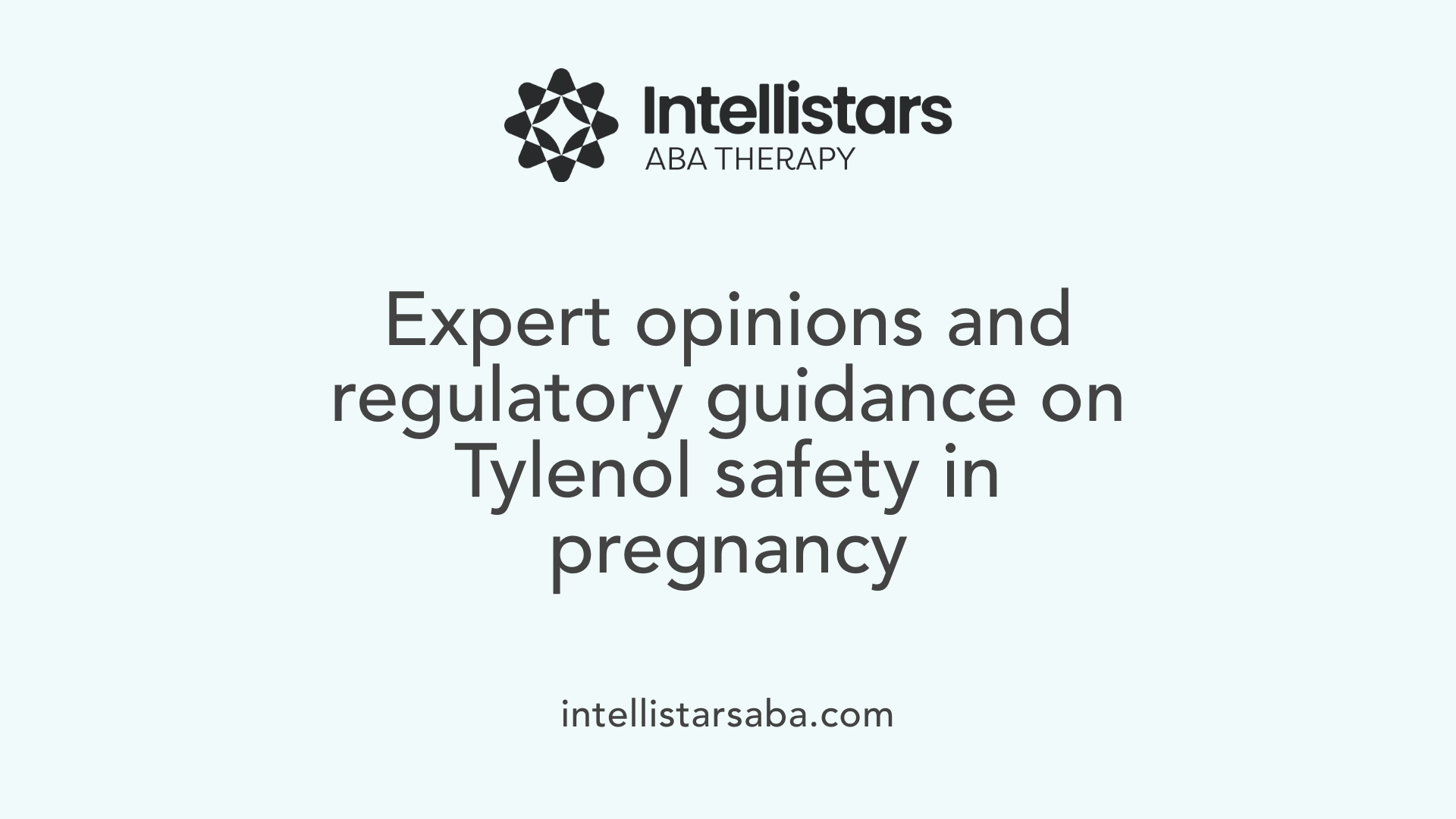Understanding the Potential Neurodevelopmental Risks of Tylenol
Recent scientific studies and ongoing reviews have brought increased attention to the possible connection between prenatal acetaminophen (Tylenol) exposure and neurodevelopmental disorders such as autism spectrum disorder (ASD) and attention-deficit/hyperactivity disorder (ADHD). While Tylenol remains a primary over-the-counter option for fever and pain relief during pregnancy, concerns about its long-term safety for fetal brain development have prompted further investigation, regulatory considerations, and cautious use advisories.
Scientific Evidence and Research Findings on Tylenol and Neurodevelopmental Disorders

What do scientific research say about the safety of using acetaminophen during pregnancy in relation to a child's neurological development?
Research on the safety of acetaminophen, commonly known as Tylenol, during pregnancy has yielded mixed results. Several large-scale cohort studies, including the Nurses’ Health Study II and the Boston Birth Cohort, have identified an association between prenatal acetaminophen exposure and a higher likelihood of neurodevelopmental disorders such as autism spectrum disorder (ASD) and attention-deficit/hyperactivity disorder (ADHD).
Recent reviews and meta-analyses, including a comprehensive study published in BMC Environmental Health, have found that the risk appears more pronounced when acetaminophen is taken regularly or for extended periods, particularly over four weeks or more. This correlation is especially noticeable during the second and third trimesters.
However, despite these associations, causality has not been definitively proven. Health authorities, including the Food and Drug Administration (FDA) and the World Health Organization (WHO), emphasize that the current evidence does not establish a direct cause-and-effect relationship. They note that genetic factors, maternal health conditions, and socioeconomic elements may confound the observed associations.
Biological explanations for potential adverse effects include the ability of acetaminophen to cross the placental barrier, where it may induce oxidative stress, alter hormone pathways, and cause epigenetic changes—all of which could impact fetal brain development. Laboratory studies suggest acetaminophen may disrupt neurodevelopmental processes by triggering oxidative stress, hormonal imbalances, and epigenetic modifications.
Despite these biological mechanisms being plausible, the data remains inconclusive. Many high-quality studies, including sibling comparison research, have found no significant link between in utero exposure to acetaminophen and increased risk of autism or ADHD.
The overarching consensus among medical experts is to recommend cautious use of acetaminophen during pregnancy. This involves limiting its use to the shortest duration necessary and at the lowest effective dose, under medical supervision. When high fevers occur in pregnant women, the risks of untreated fever—such as harm to the fetus—must be carefully balanced against potential risks associated with medication use.
In conclusion, while some studies highlight a possible increased risk of neurodevelopmental disorders with prenatal acetaminophen exposure, more research is needed for definitive answers. Pregnant women are advised to consult healthcare providers to assess individual risks and explore safe alternatives when necessary.
| Study Type | Findings | Limitations | Notes |
|---|---|---|---|
| Large cohort studies | Possible link between prenatal acetaminophen and autism/ADHD | Observational, confounding factors | Association stronger with prolonged use |
| Sibling comparison | No significant association found in sibling analyses | May not exclude all biases | Suggests familial factors play a role |
| Biological studies | Acetaminophen crosses placental barrier, may induce oxidative stress and hormonal disruption | Primarily animal/lab models | Possible mechanisms, not definitive in humans |
This complex picture underscores the importance of informed, judicious use of acetaminophen during pregnancy, with ongoing research needed to clarify risks and identify safer pain management options.
Current Research and Its Implications for Pregnant Women

What is the current scientific understanding of the potential link between Tylenol (acetaminophen) use during pregnancy and neurodevelopmental disorders such as autism and ADHD?
Recent large-scale research efforts have focused on understanding whether prenatal exposure to acetaminophen, commonly known as Tylenol, might be associated with an increased risk of neurodevelopmental conditions such as autism spectrum disorder (ASD) and attention-deficit/hyperactivity disorder (ADHD).
One comprehensive study, conducted by researchers at the Icahn School of Medicine at Mount Sinai, analyzed data from over 46 individual studies, encompassing more than 100,000 children across various countries. Using the Navigation Guide methodology—a rigorous, systematic review framework considered a gold standard—these researchers identified a notable association between prenatal acetaminophen use and subsequent diagnoses of neurodevelopmental disorders.
The strongest evidence was observed when acetaminophen was used chronically for four weeks or longer during pregnancy. This duration appeared to elevate the risk of conditions like autism and ADHD more markedly than shorter or sporadic use. Multiple studies suggest that the timing of exposure matters, with second and third-trimester use being particularly impactful.
Biological insights provide possible explanations for these findings. Acetaminophen can cross the placental barrier, meaning it directly reaches the developing fetus. Experimental studies indicate that the drug might induce oxidative stress—a damaging imbalance of free radicals that can impair cell function. Additionally, acetaminophen may disrupt hormonal pathways vital for brain development and induce epigenetic modifications—changes in gene expression that can have lasting effects on neural development.
While these associations are compelling, it is important to understand they do not prove causality. Many of the observational studies account for confounding factors, yet residual confounding can still influence the results. Some studies have not found a significant link, and health authorities emphasize that current evidence does not establish that acetaminophen definitively causes neurodevelopmental disorders.
Given the possible risks and biological plausibility, health agencies like the FDA are considering label changes to advise pregnant women to use acetaminophen cautiously—limiting duration and dosage under medical supervision. They also highlight the importance of avoiding higher-risk pain relievers like aspirin or ibuprofen during pregnancy due to known adverse effects.
In conclusion, while more research is necessary to establish definitive causality, the existing evidence suggests that pregnant women should weigh the potential risks of extended acetaminophen use carefully. Healthcare providers are encouraged to evaluate each case individually, balancing the risks of untreated fever or pain against possible developmental concerns for the fetus.
| Study Type | Number of Studies | Total Participants | Main Findings | Biological Mechanisms | Recommendations |
|---|---|---|---|---|---|
| Systematic Review (Navigation Guide) | 46+ | 100,000+ | Association with NDDs; strongest with >4 weeks use | Oxidative stress, hormone disruption, epigenetic changes | Use lowest effective dose for shortest duration |
Scientific Consensus and Organizations' Perspective
 The question of whether Tylenol (acetaminophen) use during pregnancy poses risks of neurodevelopmental conditions such as autism and ADHD has generated conflicting findings from international studies.
The question of whether Tylenol (acetaminophen) use during pregnancy poses risks of neurodevelopmental conditions such as autism and ADHD has generated conflicting findings from international studies.
Large cohort studies from countries like Sweden and Japan have provided some of the most extensive data. For example, a Swedish study involving nearly 2.5 million children observed a very small increase in autism rates among children exposed to acetaminophen in utero. However, when sibling comparison analyses were conducted within the same study, these differences disappeared, suggesting that familial or genetic factors rather than the medication itself may explain the initial findings.
Similarly, a Japanese study with over 200,000 children found no significant association between maternal acetaminophen use and autism. These results point to the possibility that confounding factors—such as maternal health conditions or socioeconomic status—may influence observed outcomes more than the medication exposure itself.
Further analyses that adjust for shared familial and environmental variables tend to weaken or negate earlier associations. For instance, some studies indicate that mothers with neurodevelopmental disorders are more likely to use acetaminophen during pregnancy, and their children may have neurodevelopmental disorders regardless of medication use. This suggests that genetic predispositions rather than acetaminophen might be driving observed correlations.
Despite these mixed results, several health authorities, including the American College of Obstetricians and Gynecologists (ACOG), the World Health Organization (WHO), and the Food and Drug Administration (FDA), advocate for careful, judicious use of acetaminophen during pregnancy. They emphasize that, based on current high-quality evidence, there is no definitive proof of causality linking Tylenol with autism or ADHD.
The FDA, in particular, highlights that acetaminophen remains the only over-the-counter medication recommended for fever management during pregnancy because of the risks associated with untreated fever, which can be harmful to both mother and fetus. These organizations recommend using the lowest effective dose and limiting duration of use, especially when taken chronically throughout pregnancy.
While ongoing research seeks to clarify the potential risks fully, current professional guidance balances the benefits of acetaminophen for fever and pain relief against the uncertainties regarding neurodevelopmental outcomes.
| Source | Main Findings | Study Size | Key Conclusion |
|---|---|---|---|
| Swedish Study | Small autism risk increase; disappears in sibling analysis | 2.5 million children | No causal link when familial factors considered |
| Japanese Study | No association with autism | 200,000 children | No evidence of risk |
| Meta-analyses & Reviews | Mixed results; confounding factors likely involved | Varies | No conclusive causal evidence |
In summary, while some studies suggest a possible association, comprehensive analyses and expert opinions align with the conclusion that current evidence does not prove harm from acetaminophen use during pregnancy when taken appropriately. Medical authorities advise continued cautious use, emphasizing personalized assessment and avoiding unnecessary or prolonged medication use during pregnancy.
Legal, Ethical, and Informational Aspects for Pregnant Women

What guidelines do organizations like ACOG, SMFM, and the FDA offer about medication use during pregnancy?
Organizations such as the American College of Obstetricians and Gynecologists (ACOG), the Society for Maternal-Fetal Medicine (SMFM), and the U.S. Food and Drug Administration (FDA) provide guidance for medication use during pregnancy. Currently, acetaminophen—sold as Tylenol—is considered safe for short-term use when taken in recommended doses. These organizations emphasize that acetaminophen remains the only over-the-counter treatment approved for fever relief during pregnancy because of its relatively favorable safety profile.
However, they also recognize new research suggesting potential risks associated with prolonged, chronic use during pregnancy. The FDA is considering a label change that reflects emerging evidence about possible links to neurodevelopmental conditions such as autism and ADHD.
Why is consulting healthcare providers important when using Tylenol during pregnancy?
While Tylenol is generally deemed safe for occasional use, medical supervision is crucial. Pregnant women should discuss any medication use with their healthcare providers to carefully weigh the benefits and potential risks.
Studies have shown that increased or prolonged use of acetaminophen may be more strongly associated with neurodevelopmental disorders in children. Therefore, medical professionals can help determine the safest approach, especially for women who need regular treatment for conditions like chronic pain or recurring fevers.
What are the risks of untreated conditions such as fever during pregnancy?
Fever during pregnancy, particularly high or persistent fever, can pose significant risks to fetal development. Elevated body temperature has been associated with increased chances of miscarriage, birth defects, and other adverse outcomes.
Because of this, managing fever is critical. The challenge lies in balancing the potential risks of medication with the dangers posed by untreated maternal conditions. In cases of fever or pain, healthcare providers typically recommend safe and effective interventions, including the cautious use of acetaminophen, to protect both maternal and fetal health.
What are the legal and informational aspects pregnant women should consider?
Pregnant women have the right to be informed about the medications they consider taking. Current research and regulatory reviews highlight the importance of cautious use, especially with medications like acetaminophen.
Legal rights include access to accurate information and guidance from healthcare professionals. It is essential to rely on evidence-based sources and to communicate openly with medical providers. This approach helps prevent misinformation and ensures the best possible outcomes for mother and child.
Summarizing the safety guidelines
| Organization | Recommendations | Considerations |
|---|---|---|
| ACOG | Use acetaminophen judiciously, avoid long-term high doses | Consult doctor for chronic use |
| SMFM | Limit use to necessary situations, follow dosing instructions | Balance benefits vs. potential risks |
| FDA | Explore label changes based on current research | Encourage medical consultation |
This table distills essential advice, emphasizing the importance of informed, supervised use during pregnancy.
Overall, while recent studies have added nuances to our understanding of acetaminophen safety in pregnancy, current guidelines endorse cautious use under medical supervision. Pregnant women should prioritize open communication with healthcare providers and fully understand the potential risks and benefits associated with any medication use during pregnancy.
Balancing Risks and Benefits in Pregnancy
While recent studies highlight the potential risks associated with prenatal acetaminophen use and neurodevelopmental disorders, definitive causal links have yet to be established. Healthcare providers emphasize prudent, limited use, focusing on the lowest effective doses and shortest treatment durations, especially during critical periods of fetal brain development. Pregnant women are encouraged to engage in open discussions with their medical professionals to make informed decisions that prioritize both maternal health and fetal safety. Ongoing research continues to explore this complex relationship, aiming to provide clearer guidance and safer management strategies for pain and fever during pregnancy.
References
- FDA Responds to Evidence of Possible Association ...
- Mount Sinai Study Supports Evidence That Prenatal ...
- Using acetaminophen during pregnancy may increase ...
- Trump links autism and Tylenol: is there any truth to it?
- Research shows no causal link between Tylenol and autism
- Evaluation of the evidence on acetaminophen use and ...
- FDA Responds to Evidence of Possible Association ...
- What the research says about autism and acetaminophen use ...






